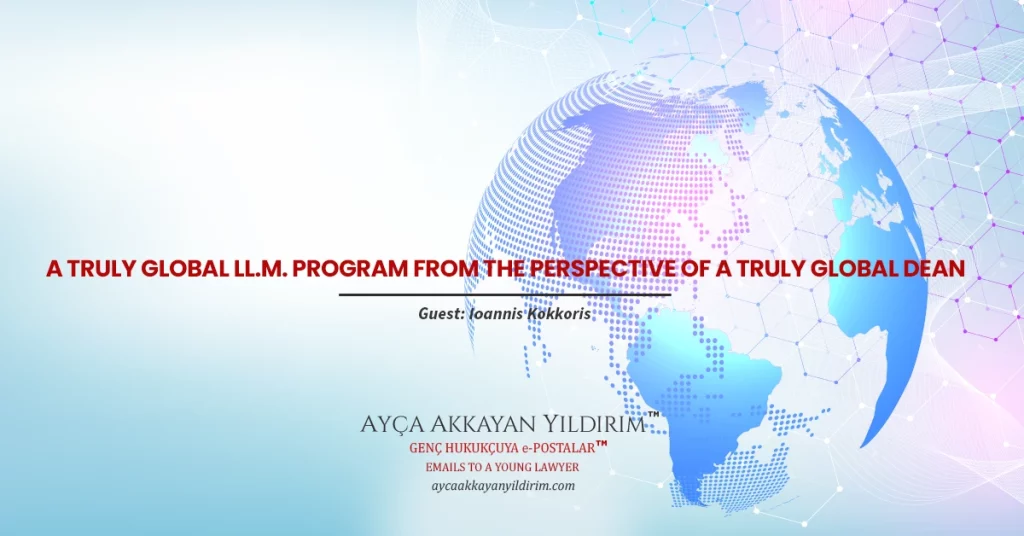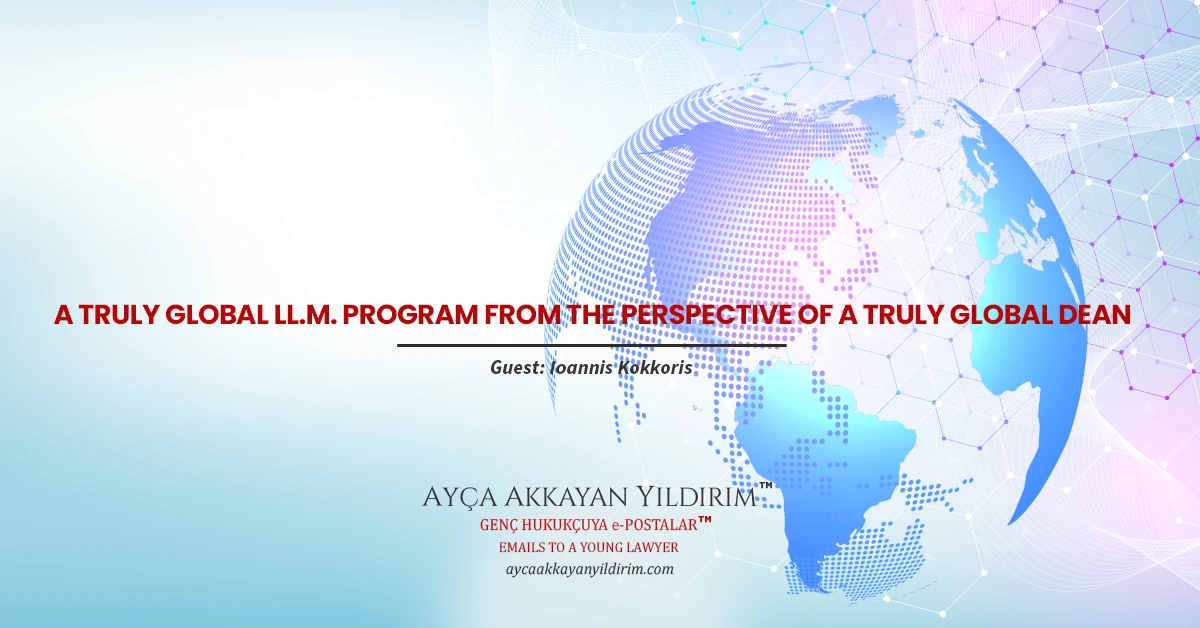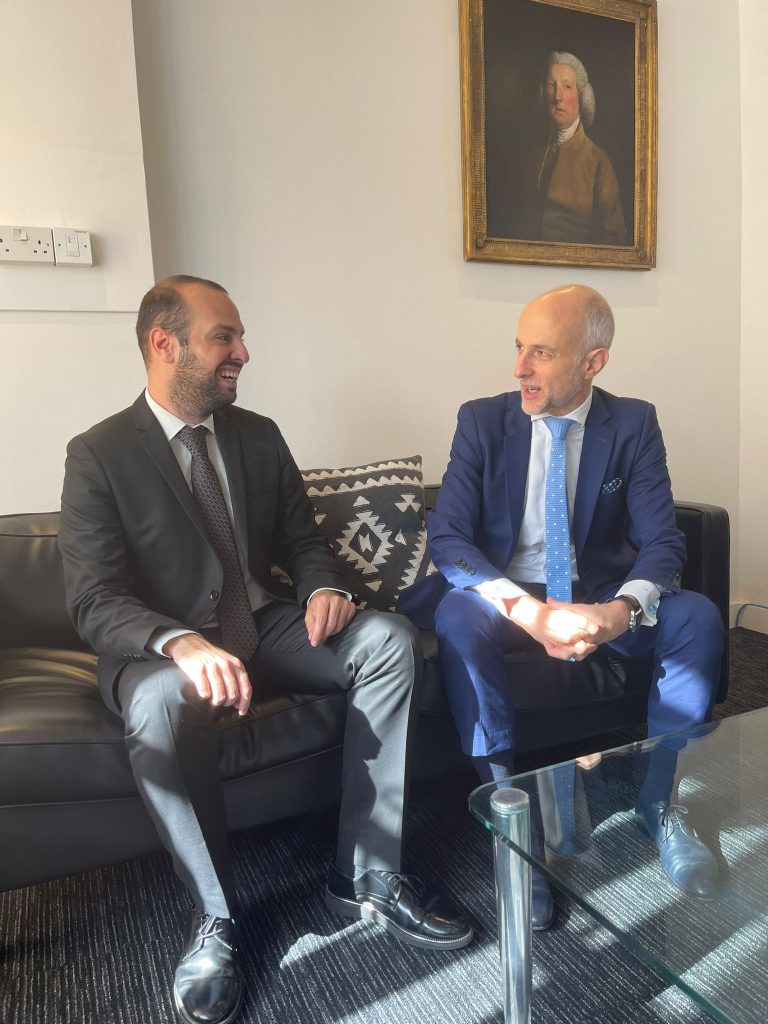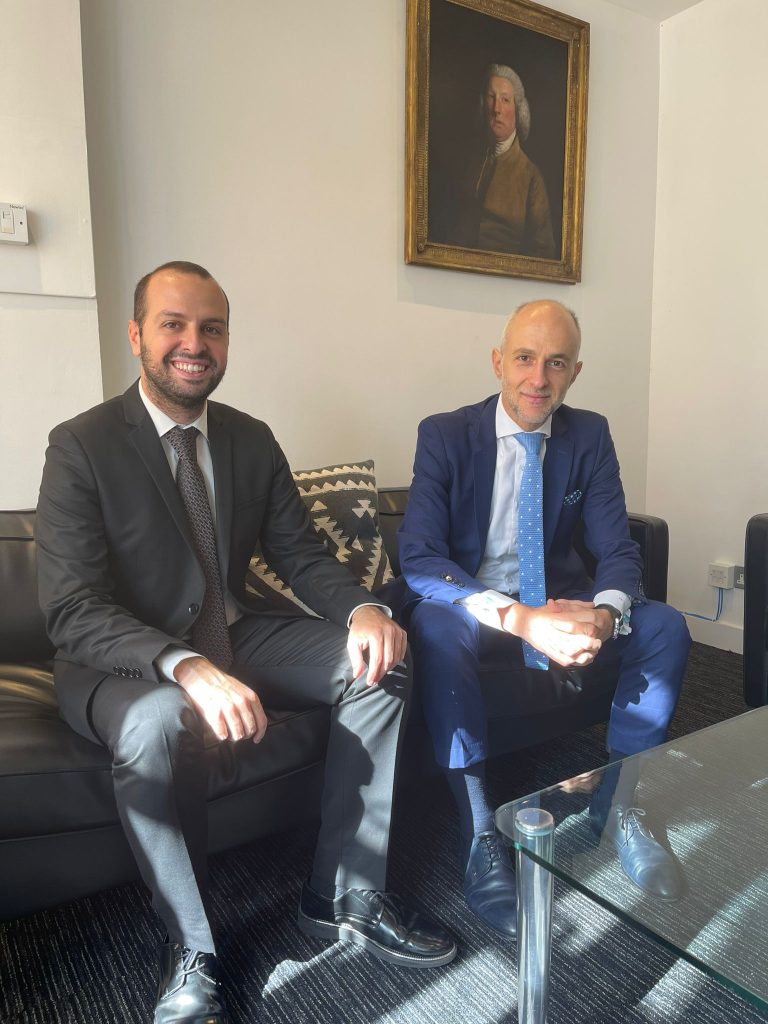Wednesday, November 1, 2023


Date : November 1, 2023
To : Young Lawyers
Re : A TRULY GLOBAL LL.M. PROGRAM FROM THE PERSPECTIVE OF A TRULY GLOBAL DEAN
INTERNATIONAL LL.M. PROGRAMS: QUEEN MARY UNIVERSITY OF LONDON, CENTRE FOR COMMERCIAL LAW STUDIES, LONDON, UK
I sincerely thank Prof. Dr. Ioannis Kokkoris, Head of the School at the Centre for Commercial Law Studies, for agreeing to do this interview, which I believe will be very beneficial for many colleagues who are considering doing an LL.M. MD
 |
 |
This interview was conducted in person on September 21, 2023, at the Centre for Commercial Law Studies.
MD: Could you please introduce yourself?
IK: My name is Ioannis Kokkoris. I am a Professor of Competition Law and Economics.
MD: I can imagine that working at Queen Mary University of London is very different from working at a law firm. How did you end up at Queen Mary University of London, and what is your role there? What kind of knowledge and skills are needed for this unique job? What do you love most about your position?
IK: Currently, I am the Head of School at the Centre for Commercial Law Studies. I had spent 8 years working for the UK government before I decided to transition to academia. I am also working with various international organisations on legal issues that allow me to keep abreast of developments in my research and practice in my area of focus. One of the aspects of my role I like most is the interaction with very clever and inquisitive students from over 100 jurisdictions and discussing cutting-edge issues in various areas of law.
MD: Why is London an ideal place to study or research law?
IK: London is the ideal place to study law. The proximity of the major international law firms and courts and the multiplicity of different areas of law practices in London give an unparalleled opportunity to students who want to excel in their legal career by attending a world-class school such as CCLS.
MD: What makes Queen Mary University of London so special?
IK: Queen Mary is very proud of our diversity among our students, academics, and our home in East London. Our diverse environment provides an excellent opportunity for students to learn in an international and multi-cultural space that widens perspective.
MD: Could you please tell us more about the various LLM specializations?
IK: We’re proud to offer over 20 different LLM specialisms at CCLS, where students can choose from 200 modules. From Intellectual Property Law to Banking and Finance Law to Technology Law, there is a huge array of options to choose from. Students also have the opportunity to choose modules from outside their specialism if they have additional interests to enhance their LLM.
MD: Among such specializations, I would like to discuss one in more depth: Comparative and International Dispute Resolution. International arbitration is an area of law that brings together academics and practitioners from all over the world and requires knowledge of various rules. What does the LLM in Comparative and International Dispute Resolution specialization of Queen Mary University of London offer, given that London is a prominent arbitration seat?
IK: The LLM in CIDR offers a range of dedicated arbitration, mediation, and ADR modules designed to provide students with all the skills they will need to pursue a career in dispute resolution. In fact, the negotiation skills are useful for life! – when to recognise you are achieving the best compromise possible! Our modules are taught by experienced professors and practitioners to ensure that the students learn the theory and practice of international arbitration – both commercial and investment – and ADR.
SIA also capitalises on its central London location with a close working relationship with law firms, corporations, and arbitral institutions. We organise guest lectures from leading professionals in the fields so students get a chance to meet as many people working in the area as possible.
We also have annual events, for example, the Freshfields lecture. This is one of the largest arbitration events of the year, with practitioners traveling from across the world to attend. It is in its 38th year, and we are delighted to have Judge Christopher Greenwood speaking this year on 14 November 2023.
The annual joint SIA-ICC Institute symposium is another example of our close collaboration with the arbitral community. It is in its 39th year, and the location alternates between London and Paris – home of the ICC Arbitration Centre. This year it will take place in London.
MD: Arbitration practice has become more and more global, cross-cultural, and transnational. Do you think Queen Mary University of London has been acting as a global platform for alternative dispute resolution by bringing different global players together? What makes Queen Mary University of London unique?
IK: As discussed above, the SIA has close contacts with many of the arbitral institutions globally. This year, we are arranging another event with the ICSID (International Centre for the Settlement of Investment Disputes) on the application of their new arbitration rules. Through our empirical research on various aspects of the arbitration process – most recently on energy arbitration and the impact of covid 19 on arbitration – we engage globally with the dispute resolution community from end users to arbitrators. These Surveys are available online and are widely regarded and cited by Courts, Tribunals, and academics globally.
What makes the SIA at QM unique is that we are the oldest dedicated arbitration institute in the world. Professor Lew set up the School in 1985 as he felt it was important to teach dispute resolution as a separate discipline and not part of public or private international law. Having worked in this field, he recognised that it was a growing area as arbitration was the preferred dispute resolution option of choice for international commerce. Since that time, the School has grown, and the number of modules offered has expanded to keep track of important developments in the field, including, for example, energy & arbitration law and arbitration skills and advocacy.
The focus of the SIA is to give students a comprehensive understanding of the importance of dispute resolution today. Even students who may not wish to become dispute resolution lawyers or arbitrators benefit from being aware of the importance of dispute resolution clauses in contracts. They can use this knowledge in a range of sectors, from banking & finance to IP.
MD: Will the Comparative and International Dispute Resolution LLM continue to attract an increasing number of students? What is Queen Mary University of London’s trajectory for the future? What do you think the future will bring?
IK: We believe that we will continue to attract top-class students from around the world. Although, unlike in 1985, there are now other Universities that offer a dispute resolution specialism, we remain competitive. We continue to review and update modules to reflect the changes in the sector; for example, there are now a lot more modules dedicated to investment and energy arbitration as these sectors have grown significantly.
We encourage our students to participate in the moots each year from Vis Moot, Frankfurt Investment Moot, and the Sports Arbitration Moot. It is not only an enjoyable experience as they meet teams from all around the world, but it provides a keen insight into the preparation of written and oral pleadings.
The SIA is starting to plan for its 40th Anniversary celebration. We believe that there will continue to be strong interest in dispute resolution. The main changes are most likely to be in the area of AI and its use in the arbitration process. For now, it is used mainly as a tool to find specific documents or data in cases where the evidence is extensive. It is expected that its role will expand to also include being involved in the ultimate decision-making process, perhaps together with a Presiding human arbitrator. There will continue to be hybrid forms of arbitration post covid, with most procedural hearings being held online. A final area that may see change is the type of disputes referred to arbitration. The number of cases relating to climate change and the energy transition required to address the climate crisis is set to increase in the next decade. Questions of stranded assets as a result of Government actions will need to be considered – who will ultimately bear the cost? For example, will it be the company that can no longer run the coal plant, as happened in The Netherlands, or will it be the Government (i.e., us, the taxpayer)?
MD: Queen Mary University of London also offers a unique postgraduate study opportunity in Paris. Could you please briefly explain this program?
IK: Our Paris LLM programme offers a unique opportunity for students to benefit from the expertise of Queen Mary’s academic teaching in the beautiful setting of Paris. Taught in English, students get the same Queen Mary degree but can study in Europe with a flying faculty.
MD: Could you explain the LLM admissions process at Queen Mary University of London? Considering the volume of applications you receive each year, who would be an ideal LLM candidate for Queen Mary University of London?
IK: Those applying for an LLM are required to have a 2:1 or equivalent in an undergraduate LLB degree. We do accept students with 2:2 or equivalent, but they are required to have legal experience to counteract their lower grade. Students can make applications directly through our website.
MD: What would be your advice to prospective applicants who wish to pursue an LLM program at Queen Mary University of London but have financial limitations?
IK: A wide selection of scholarships is available for students wishing to study at Queen Mary; they can be found on our website.
MD: Are there any employment or internship opportunities for LLM students or graduates in London?
IK: CCLS has a dedicated careers team for postgraduate law students where we run events and support to help students looking for employment during or after their studies. We also have our own in-house pro-bono legal clinic, qLegal, where students can apply to work to gain experience during their studies, giving legal advice to start-up organisations.
MD: Lastly, what would be your parting message for our readers?
IK: Doing an LLM is a very important step in a lawyer’s career, and the choice of the institution is of pivotal importance. The research credentials of the academics and their experience in practice in the various areas of law are also essential in equipping the students with the right academic and practical perspective.
